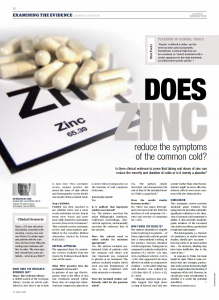 This article was published in Medical Observer.
This article was published in Medical Observer.
The article is also available on the Medical Observer website (may need registration).
Clinical scenario
Dylan, a 20-year old university student, came in with sneezing, a runny nose and sore throat. It’s winter again and patients with the common cold have been filling the waiting room. Between sniffles he asks, “my mum says that I should take some zinc tablets – what do you think?”
Clinical question
Does oral zinc reduce the duration or severity of symptoms of the common cold in adults?
What does the research evidence say?
Step 1: The Cochrane Library
A quick search of the Cochrane Library reveals an article published in 2011 that is up-to-date to June 2010. [1] This systematic review seemed positive but noted the issue of side-effects, and heterogeneity in the details and results of the included trials.
Step 2: PubMed
I next went to PubMed to see whether there was a more recent systematic review. I searched for “(zinc) and (common cold); limited to systematic reviews; from 2010; in humans”. Ah ha! There is a newer systematic review and meta-analysis published in the Canadian Medical Association Journal by Science et al. (2012) which I will look at closer: [2]
Critical appraisal
I will use the appraisal sheet for systematic reviews available from the Centre for Evidence Based Medicine. [3]
What PICO question does the systematic review ask?
In patients of any age (Participants); what is the effect of oral zinc treatment started within three days of symptoms (Intervention); compared to placebo or no intervention (Comparator); on the duration of cold symptoms (Outcome).
Is it clearly stated?
Yes.
Is it unlikely that important studies were missed?
Yes. The authors searched the major bibliographic databases, conference proceedings, clinical trial registries, and manually searched the reference lists of key articles.
Were the criteria used to select articles for inclusion appropriate?
Yes. The authors included randomised trials of patients with the common cold where oral zinc treatment was compared to placebo or no treatment. The authors excluded studies which used non-oral formulations of zinc, or zinc combined with other minerals or vitamins.
Were the included studies sufficiently valid for the question asked?
Yes. The authors clearly described and documented the risk of bias of the included studies (Table 2, page E556). [2]
Were the results similar between studies?
No. There was major heterogeneity between trials for both the duration of cold symptoms (I2 = 95%) and severity of symptoms (I2 = 55%).
What were the results?
The authors identified 17 eligible trials involving 2121 patients – of these 8 trials could be pooled into a meta-analysis looking at the primary outcome (duration of cold symptoms). Taking zinc as compared to placebo reduced the duration of a cold by −1.65 days (95% confidence interval −2.50 to −0.81). Zinc appeared to be more effective in adults as compared to children – in the adult subgroup, cold duration was reduced by −2.63 days (95% CI −3.69 to −1.58, I2 = 82%).
Subgroup analyses also possibly suggest that high doses (≥ 75 mg of ionised zinc) and zinc acetate (rather than other formulations) might be more effective. Adverse effects were more common on zinc than placebo.
Conclusion
This systematic review provides moderate grade evidence that using oral zinc provides a clinically significant reduction in the duration of common cold symptoms in adults. It also provides moderate grade evidence of the increased the risk of adverse effects, particularly in bad taste and nausea. [2] The heterogeneity, i.e., the lack of consistency in results between studies should give us pause – this may relate to an unaccounted bias – for instance, blinding may have been ineffective due to the taste of zinc. [4]
In response to Dylan, his mum might be right! There is some evidence that zinc lozenges, particularly in the acetate form and in high doses, might reduce the duration of symptoms of his cold. However, he should give some consideration on whether it is worth the potential side-effects.
Stat Facts
Placebos in clinical trials
“Placebo” is difficult to define, and the term has been used inconsistently. Nonetheless, in clinical trials they can be considered as “control treatments with a similar appearance to the study treatments but without their specific activity”. [5]
References
- Singh M, Das RR. Zinc for the common cold. Cochrane Database of Systematic Reviews 2011, Issue 2. Art. No.: CD001364. DOI: 10.1002/14651858.CD001364.pub3
- Science M, Johnstone J, Roth DE, Guyatt G, Loeb M. Zinc for the treatment of the common cold: a systematic review and meta-analysis of randomized controlled trials. CMAJ 2012; 184(10): E551-E561. DOI: 10.1503/cmaj.111990
- Systematic Review: Are the results of the review valid? Centre for Evidence Based Medicine, University of Oxford. http://www.cebm.net/index.aspx?o=1157 Retrieved: 2013 June 11
- Desbiens NA. Lessons learned from attempts to establish the blind in placebo-controlled trials of zinc for the common cold. Ann Intern Med 2000; 133(4): 302-303. DOI:10.7326/0003-4819-133-4-200008150-00016
- Hróbjartsson A, Gøtzsche PC. Is the placebo powerless? – An analysis of clinical trials comparing placebo with no treatment. N Engl J Med 2001; 344: 1594-1602
